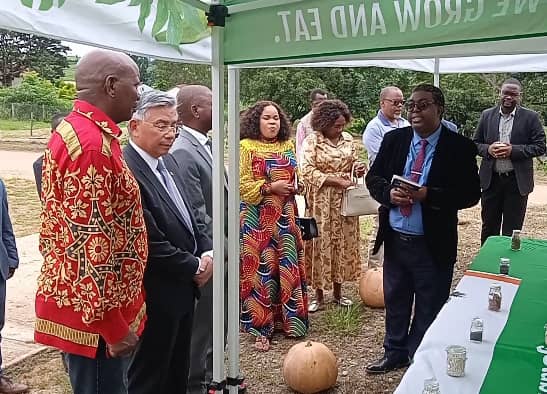BY MBONO MDLULI
MBABANE – The preservation of all seeds within the country can significantly aid Eswatini in realising its objective of food sovereignty.
This assertion was made by Prime Minister Russell Mmiso Dlamini on 28 February 2025, during his tour of the revamped Eswatini Plant Genetic Resource Centre (Gene Bank) located at the Malkerns Research Station. The Gene Bank had been revitalised through the support of the Embassy of the Republic of China (Taiwan), as part of the Taiwan Africa Vegetable Initiative (TAVI).
The Prime Minister was represented by Minister of Agriculture Mandla Tshawuka, due to his prior commitments to other critical national duties. In his remarks at the event, the Prime Minister emphasised that seed multiplication and distribution have been weaponised by certain nations, making it imperative for Eswatini to produce and preserve its own genetic material.

According to the Premier, the Eswatini Plant Genetic Resource Centre required rehabilitation of its infrastructure and upgrading of equipment and systems to adopt new technologies. He noted that a gene bank serves as a crucial facility for any nation, as it not only promotes crop diversity through the multiplication and bulking of scarce genetic material but also safeguards it for future generations.
Renowned philosophers assert that the current environment is a legacy bestowed upon us by future generations, thus necessitating that we manage it with utmost care and responsibility. He highlighted the importance of preserving biodiversity, stating that the gene bank would assist in achieving this objective. The gene bank has already commenced the collection of indigenous plants and seeds that are at risk of extinction. These are stored using specialised equipment and techniques, ensuring that future generations will not merely read or hear about them, but can also see and appreciate them, just as we and our ancestors have.
Safeguarding these seeds and other genetic materials is vital, not only for protecting our agri-food systems but also for preserving our national heritage.
The bank was established in 1990 and its purpose is to ensure that Eswatini has food sustainability. In other words, it is to ensure that Emaswati are able to plant the seeds in future and for many generations to come.
Genebank Chief Research Officer Thembinkosi Gumedze said the bank had mostly the indigenous plant seeds. Gumedze mentioned that some of these plants had been in cold storage for a period exceeding 30 years now.
He said the bank also preserved seeds whose plants could face the danger of being extinct. The bank has a responsibility of preventing that from happening, according to Gumedze. He also mentioned that types of plant seeds they had included different kinds of maize, including yellow maize (sangalane). They also had seeds for beans, cow peas, water melons, and other seeds.








